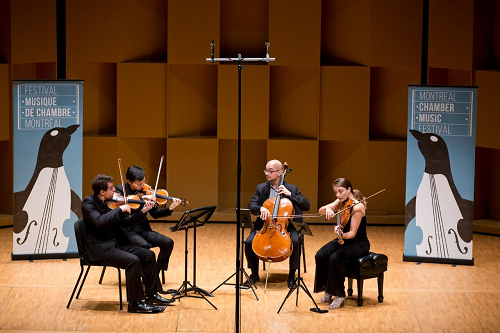 Canada Beethoven: Dover String Quartet (Joel Link and Bryan Lee, violins; Milena Pajaro-Van de Stadt, viola; and Camden Shaw, cello), Pollack Hall, McGill University, Montréal, 11.6.2017. (LV)
Canada Beethoven: Dover String Quartet (Joel Link and Bryan Lee, violins; Milena Pajaro-Van de Stadt, viola; and Camden Shaw, cello), Pollack Hall, McGill University, Montréal, 11.6.2017. (LV)

Beethoven – String Quartets in C minor Op.18 No.4; F major Op.135; C-sharp minor Op.131
In front of an enthusiastic Pollack Hall audience on the campus of McGill University, the Dover Quartet concluded their Beethoven cycle – their third this year! – at the Montréal Chamber Music Festival with three very different quartets and three strikingly different performances. Op.18 No.4 was rough and violent, Op.135 emerged seeking and enigmatic, and Op.131 made a sleek and powerful ending.
Members of the Dover Quartet graduated from the Curtis Institute of Music, where they originally played together as the Old City String Quartet in 2010, and took their name from fellow Curtis alumnus Samuel Barber’s Dover Beach. They rose quickly to prominence after winning the Banff International String Quartet Competition in 2013, the Cleveland Quartet Awards in 2016/17 and 2017/18, and the Avery Fisher Career Grant in 2017. Their youth was evident in the intensity they invested in their playing, and in the digital scores on tablets, propped up incongruously on conventional music stands.
The Dover Quartet began matters by ripping into the early C-minor quartet with fire and abandon, sacrificing pure beauty (but never pure intonation) for movement and continuity across varying amounts of territory, almost entirely free of portamenti as they would be for the whole concert. In the modern mode, they took dynamic and expressive marks at face value as much as for their broader implications, revealing four clearly individual musicians committed to making unified musical statements.
First violinist Joel Link had an unshakeable technique along with his colleagues, and a wonderfully gentle sensitivity, so much so that occasionally, in moments of great musical stress, his line receded into the quartet’s overall fabric. A similarly unshakeable second violinist Bryan Lee had a harder tone and contributed more forceful expressive accents. Violist Milena Pajaro-Van de Stadt had a gorgeous sound and charismatic presence. Cellist Camden Shaw played as accurately as a surgeon yet with the kind of consoling warmth that the cello provides best.
The Dover came down to earth in Op.135, in which they tried discerning the music’s mental states before settling into an affectionate performance that brought it closer to Op.18 than the late quartets. Although ideally this last quartet or the Grosse Fuge ends the cycle; as it was, tucked in between the passionate C minor and the iconic Op.131, it seemed both highly entertaining and surprisingly inconsequential.
In an American Viola Society interview a few years ago, cellist Shaw singled out a performance of Op.131 as his most powerful musical experience because, “the only page turn that was impossible was the last page of the piece, so for the whole performance I saw the very last page waiting there on the stand. Something about that really stuck with me—about being somehow aware of the end, through our whole journey—it seemed to match so perfectly with the piece and with Beethoven grappling with the idea of the ultimate end. By the time we were playing the last page, I was almost in tears onstage.”
The Dover’s Op.131 Sunday afternoon was like that. Every entry in the iconic opening fugue was presented in its turn as if they were searching for the meaning by stretching the dimensions of the musical structure and expressive content. After a sweet-toned Allegro molto vivace, their anticipatory relish in the brief Allegro moderato led into an Andante movement that was very cantabile indeed, with unusually luxurious sound, and especially in the cello, big, luscious pizzicati.
The Dovers invested all the planes of the movement with warmth, smoothing out potentially rough spots without sacrificing textual fidelity; when the big string solos came at the end of the movement, the effect was overwhelming. After a moderately-paced Presto, the Dover’s Adagio quasi un poco andante set the stage for a final Allegro painted with incisive, raw-boned strokes leading to the inevitably sad, wistful end. I could not tell whether tears came again to the cellist’s eyes, but after a nanosecond, the audience erupted in roars and applause.
In fact, the Dover’s cycle was such a musically transformative event that the Festival’s founding director, Denis Brott, announced a new Festival initiative: Beethoven quartet cycles every three years, starting in 2020.
Laurence Vittes